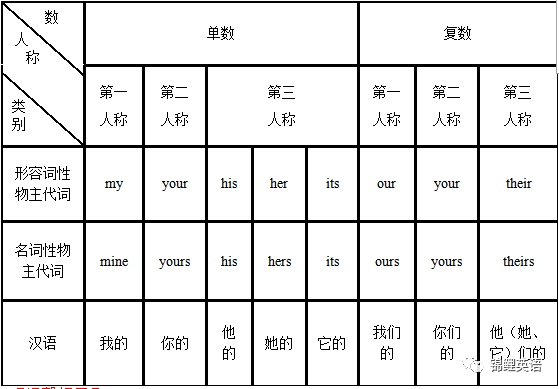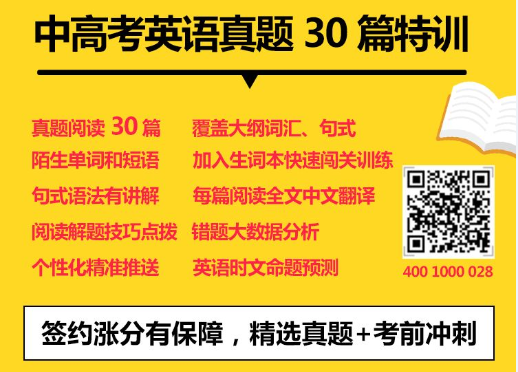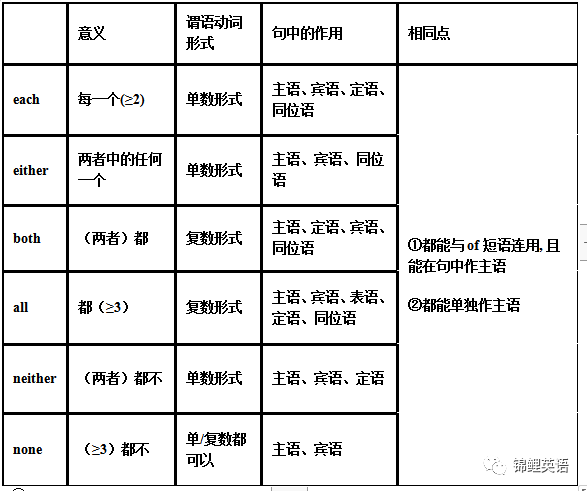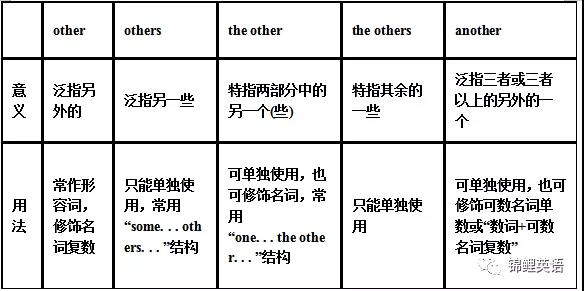福建厦门中考英语暑假训练营答案,英语辅导班怎样选择?哪家好?
作者:未知 时间:2020-05-20 阅读:( )
考点一人称代词
人称代词即指对人的称呼的词(你、我、他等),分为主格和宾格两种形式。
|
用法 分类 |
主格 |
宾格 |
|
单数 |
I, you, he, she, it |
me, you, him, her, it |
|
复数 |
we, you, they |
us, you, them |
|
功能 |
作主语 |
作及物动词、介词的宾语,be动词的表语,省略句中表示相同的情况 |
|
例句 |
She is a singer. 她是一名歌手。 I can play the guitar. 我会弹吉他。 |
—We don’t know him. 我们不认识他。 —Me, too. 我也是。 |
【巧学妙记】
人称代词的主格和宾格
人称代词分两格,分为主格和宾格。
主格句中作主语,宾语用的是宾格。
句首、动前用主格,动后介后用宾格。
【温馨提示】
人称代词语序
单数人称代词并列作主语时用“二、三、一(you, he/she and I)”;
复数人称代词并列作主语时用“一、二、三(we, you and they)”。
①You, he and I are all good friends.
你、他和我都是好朋友。
②We, you and they like the same sport.
我们、你们和他们都喜欢同一项运动。
注意:在承认错误、担当责任时,把说话人I放在首位。
【巧学妙记】
人称代词的排列顺序
人称代词并列现,排列顺序记心间。
单数形式二、三、一,复数形式一、二、三。
若把错误责任担,第一人称最当先。
考点二 物主代词
物主代词即指事物的主人(我的,你的,他的),分为形容词性物主代词(名词前)和名词性物主代词(后无名词)。

【温馨提示】
形容词性物主代词与名词性物主代词的区别:
|
词类 |
区别 |
例句 |
|
形容词性 物主代词 |
位于名词前,用作定语,限定该名词的意义 |
May I use your pen? Yours works better. 我可以用你的钢笔吗?你的更好用。 |
|
名词性物 主代词 |
在句子中充当主语、宾语或表语,相当于“形容词性物主代词+名词”,后面不能再跟名词 |
【巧学妙记】
形物代词能力差,自己不能来当家。
句子当中作定语,后面要把名词加。
名物代词能力强,自己独来又独往。
句子成分主表宾,后面名词不能跟。
考点三 反身代词
1. 反身代词的单复数形式
反身代词就是指某人自己,单数以-self结尾,复数以-selves 结尾。
第一、二人称反身代词由形容词性物主代词+self/selves构成,
第三人称反身代词由宾格人称代词+ self/selves构成。
|
数 人称 |
第一人称 |
第二人称 |
第三人称 |
|
单数 |
myself |
yourself |
himself, herself, itself |
|
复数 |
ourselves |
yourselves |
themselves |
①Tom enjoyed himself in the Water Park.
汤姆在水上公园玩得很开心。
②“I’ll teach myself. I’m sure I can do it by myself. ” Linda said to herself.
琳达心里想:“我要自学,我确定我能独立做它。”
2. 反身代词的语法功能
(1)作宾语
当主语与宾语是同一人时,宾语要用反身代词,人称和数要与主语一致
We teach ourselves English. 我们自学英语。
(2)作同位语
用来加强语气,作主语的同位语时,有时为了使句子平衡而把同位语放在句子末尾
I can do it myself. 我自己能做它。
(3)作表语
常与系动词be,look, feel,seem连用,表示或描述一种感觉、情绪或状态
I don’t feel myself today. 我今天感到不舒服。
【巧学妙记】
反身代词表自身,“宾、表、同位”三成分。
动、介词后作宾语,表示动作回自身。
表示强调同位语,强调动作“亲自”任。
系动词后作表语,各种用法记心中。

考点四 不定代词
不明确指代某个(些)人、某个(些)事物的代词叫不定代词。
|
不 定 代 词 |
功能 |
在句中可以作主语、表语、宾语和同位语等 |
|
|
分 类
|
肯 定 性 |
both, all, many, much, one, other, each, another, either, a few, a little, some (someone, somebody, something, somewhere), any (anyone, anybody, anything, anywhere), every (everyone, everybody, everything, everywhere) |
|
|
否 定 性 |
no, neither, none, nobody, nothing, few, little |
||
不定代词的特殊用法
(1)当形容词或else修饰不定代词时,不定代词总是位于修饰词的前面。例如:
①There is nothing new in his speech.
在他的演讲中没有新内容。
②Did she tell you anything else?
她告诉你别的事情了吗?
(2)当句子的主语是指人的复合不定代词时,其反意疑问句的主语通常用代词they 来代替;当句子的主语是指物的复合不定代词时,其反意疑问句的主语通常用代词it来代替。例如:
①Everyone is here, aren’t they?
大家都在这儿,难道不是吗?
②Everything begins to grow in spring, doesn’t it?
春天万物开始生长,不是吗?
常见不定代词的用法
1. some/any的用法比较
|
some |
(1)一般用于肯定句中,表示“一些,某些;某个” (2)也可用于疑问句中,希望得到对方的肯定回答或委婉提出建议与要求 |
|
any |
(1)一般用于否定句、疑问句及条件句中,表示“任何一个/ 一些” (2)也可用于肯定句中,表示“任何”的意思 |
①Would you like some coffee? 你要来点咖啡吗?
②You can ask me any question. 你可以问我任何一个问题。
2. few,a few和little,a little的用法比较
|
little |
很少 |
few |
很少 |
表否定 |
|
a little |
少量,有一些 |
a few |
有几个,有一些 |
表肯定 |
|
修饰不可数名词 |
修饰可数名词 |
|||
①The problem is too difficult, few students can work it out.
这道题太难了,没几个学生能做出来。
②She says little but does much. 她说得少,做得多。
3. each/either/both/all/neither/none

①All of the boys in our class like Yao Ming.
我们班所有的男生都喜欢姚明。
②None can speak Japanese in our class.
我们班里无一人会说日语。
4. other/others/the other/the others/another

①There are many foreigners here. Some are Americans, the others are Australians.
这里有许多外国人,一些是美国人,其余的全是澳大利亚人。
②I have two photos. One is black and white, the other is colourful.
我这里有两张照片。一张是黑白的,另一张是彩色的。
③I don’t like this one. Have you got any others?
我不喜欢这个,你还有别的吗?
④I don’t like the pen. Please show me another one.
我不喜欢这支钢笔。请给我看另一支。
5. one/it的用法比较
|
one |
代指上文中提到的同类事物中的一个(非原物) |
|
it |
代指上文中提到的同一事物(原物) |
Joe has a pet dog. It’s very lovely. I want to have one like it, too.
乔有只宠物狗,它很可爱。我也想拥有一只像它一样的(小狗)。
【温馨提示】
it的其他用法
|
(1)代指婴儿或不明身份的人 |
—Who’s knocking at the door? ——谁在敲门? —It must be my brother. ——它一定是我的弟弟。 |
|
(2)表示天气、时间或距离 |
It’s 8: 00 now and it’s raining hard. 现在是八点钟,雨下得正大。 |
|
(3)答语中代替this/that |
—What’s that? ——那是什么? —It’s a snowball. ——它是一个雪球。 |
|
(4)形式主语常见句式 |
A. It’s +adj. + (for sb. ) to do sth. B. It’s time for sb. to do sth. C. It takes (took/will take) sb. +时间+to do sth. D. It seems +that从句 E. It’s +adj. +that从句 |
|
(5)形式宾语 |
You’ll find it interesting to be with us. 你会发现和我们相处很有趣。 |
考点五 指示代词和疑问代词
1. 指示代词
|
单数 |
复数 |
用法 |
|
this |
these |
一般用来指在时间或空间上较近的事物或人。 Toys! These are my toys! 玩具!这些是我的玩具! |
|
指下面将要讲到的事物。 What I want to say is this: pronunciation is very important in learning English. 我想说的是:发音在英语学习中非常重要。 |
||
|
that |
those |
指时间和空间上较远的事物或人。 In those days the workers had a hard time. 在那些日子里工人们有着艰苦的时光。 |
|
指前面讲到过的事物。 I had a cold. That’s why I didn’t come. 我感冒了。那是我没来的原因。 |
||
|
有时为了避免重复提到的名词,常用that或those代替。 Television sets made in Beijing are just as good as those made in Shanghai 北京制造的电视机和上海制造的一样好。 |
【温馨提示】
(1)打电话时用this介绍自己,用that询问对方。例如:
This is Sally speaking. Is that Linda?
我是萨莉。你是琳达吗?
(2)that 常用于比较结构中,代替前面提到的单数名词或不可数名词;若前面提到的是复数名词,则用those代替。例如:
①The weather in Guangzhou is much warmer than that in Beijing in winter.
冬天广州的天气比北京的暖和得多。
②The apples on this tree are bigger than those on that one.
这棵树上的苹果比那棵树上的大。
2. 疑问代词
常见疑问代词及其用法
|
疑问代词 |
意义 |
基本用法 |
例句 |
|
who |
谁 |
主语、表语、宾语 |
Who are you waiting for? 你正在等谁? |
|
whom |
谁 |
宾语(who的宾格) |
With whom did you go swimming? 你和谁去游泳的? |
|
whose |
谁的 |
主语、表语、宾语、定语(who的所有格) |
Whose pen is this? 这是谁的钢笔? |
|
what |
什么 |
主语、表语、宾、定语 |
What do you know about it? 你对它了解多少啊? |
|
which |
哪个 |
主语、表语、宾、定语 |
Which movie do you like best? 你最喜欢哪部电影? |
代词练习题
Ⅰ. 用所给词的适当形式填空
1.Simon and Linda didn’t tell us the news. They wanted to keep the secret to _____ (they).
2.The story _____ (it) is interesting, but it’s a little difficult for children.
3.Our teachers encourage us to join the volunteer project to help _____ (other).
4. Their teachers are as friendly to students as _____ (we).
5.Don’t worry about your son. He is old enough to be independent and live by _____ (he).
Ⅱ. 单项选择
1.— Is your father or mother a teacher?
— _____ . My father is a doctor and my mother is an office worker.
A. Both
B. Either
C. Neither
D. None
2.— Which of the two T-shirts will you take?
— I’ll take _____ . One is for my brother and the other is for myself.
A. either
B. both
C. all
3.—Where is my pen?
—Oh, sorry, I have taken ______ by mistake.
A. yours
B. mine
C. hers
D. his
4.—Jack, who helped _____ make the model ship?
—Nobody! I made it all by ______ .
A. your; my
B. your, mine
C. you; myself
D. you; mine
5.—Where did you go for your winter vacation?
—My family went to Paris. ______ had a great time.
A. He
B. She
C. We
D. They
6.There’s ______ wrong with the camera. Look! It works well.
A. something
B. nothing
C. everything
7. Welcome to my new house, Ann and John! Help _____ to some fruit.
A. myself
B. yourself
C. yourselves
8. —Is this your key, Jenny?
—No. _____ is in my handbag.
A. His
B. Hers
C. Mine
D. Yours
9. —The pet cat in your hand is very nice. Is it _____ ?
—Yes, but I’ll give it to my friend Lucy as _____ birthday present.
A. you; her
B. your; her
C. yours; her
D. you; hers
10. A foreign visitor is coming to visit our new house this evening. My mother will offer him _____ to eat.
A. anything delicious
B. something real Chinese
C. something Japanese food
D. delicious something
11. —Who helped Jessie with her English?
— _____ . She taught herself.
A. Anybody
B. Somebody
C. Nobody
D. Everybody
12. I have two brothers. One is a teacher, ______ is a doctor.
A. another
B. other
C. others
D. the other
13. — _____is that man over there?
—He is Dick’s uncle.
A. Where
B. What
C. Who
D. Which
14. —What are _____ teachers doing?
—They are having a meeting.
A. this
B. that
C. those
15. —How did your uncle learn to play the guitar?
—By _____ .
A. myself
B. yourself
C. herself
D. himself
答案:Ⅰ. 用所给词的适当形式填空
1. themselves2. itself3. others 4. ours5. himself
Ⅱ. 单项选择
1.【解析】选C。由答语可知其爸爸和妈妈都不是教师,两者都不,应用neither, 故选C。
2.【解析】选B。由答语“一个给我弟弟,另一个给我自己。”可知将买这两件T恤衫。故用both。
3.【解析】选A。由上一句可知答语应为:哦,对不起,我错误地拿走了你的。yours在此作宾语,故选A。
4.【解析】选C。help后跟人称代词宾格作宾语;by oneself意为“某人自己”,故选C。
5.【解析】选C。考查人称代词的用法。句意:——寒假你们去哪里了?——我们一家去了巴黎。我们玩得很开心。my family应该用we代替。故选C。
6.【解析】选B。考查不定代词的用法。由“它运行得非常好。”可知这架相机没有问题。
7.【解析】选C。考查反身代词的用法。由于称呼的对象是两者(Ann and John), 因此用yourselves。故选C。
8.【解析】选C。由上下句的问答可知,回答应是“不。我的(钥匙)在我的手提包里。”排除A、B与D选项。名词性物主代词Mine在此相当于My key,在句子中作主语。故选C。
9.【解析】选C。形容词性物主代词后要接名词,名词性物主代词后不接名词。本题问句中空格后没有名词,故填名词性物主代词;答语中空格后有名词 birthday present,故填形容词性物主代词。故选C。
10.【解析】选B。考查不定代词的用法。肯定句中多用something而不用anything。something to eat意为“吃的东西”,故短语中不再体现食品,而当形容词修饰不定代词时要将其放在不定代词之后。故选B。
11.【解析】选C。由答语中“她自学的”可知是“没人教她”,故选C项。nobody没有人。
12.【解析】选D。句意:我有两个哥哥。一个是老师,另外一个是医生。one. . . the other. . . 意为“(两者中的)一个……另一个……”。
13.【解析】选C。考查疑问代词的用法。由答语“他是迪克的叔叔。”可知询问的是“那边的那个男人是谁?”故选C。
14.【解析】选C。所给的三个选项中只有those “那些”可修饰复数名词teachers;this,that后接名词的单数形式。故选C。
15.【解析】选D。by oneself “某人自己”,由主语是your uncle可知用其反身代词himself,故选D。
奇速英语全国热线:400-1000-028
欢迎关注微信公众号:奇速优课
工号:QS0043
注:图文源于网络,如有侵权请联系我们删除!
-

2025奇速英语单词速记训练营:不一样的词汇探索
(192)人喜欢 2024-10-16 -

2025冬日英语冬令营:速记单词,挑战自我
(124)人喜欢 2024-10-15 -

2025奇速英语单词速记冬令营乐园:冬日里的词汇嘉年华
(123)人喜欢 2024-10-15 -

2025中小学寒假冬令营:英语单词速记的奇妙之旅
(175)人喜欢 2024-10-15 -

奇速英语单词速记风暴:冬令营里的词汇盛宴欢迎你来挑战
(149)人喜欢 2024-10-15 -

2025奇速英语单词速记冬令营:助你逆境中的词汇奇迹
(181)人喜欢 2024-10-15 -

2025英语单词速记加油站:奇速冬令营助你飞速进步
(92)人喜欢 2024-10-15 -

2025突破中小学英语基础:英语单词速记冬令营之旅
(199)人喜欢 2024-10-15 -

2025冬日英语冬令营:速记单词,乐享学习 英语单词速记训练营:冬日里的词汇狂欢
(99)人喜欢 2024-10-15 -

2025英语单词速记特训:冬令营中的词汇冲刺
(197)人喜欢 2024-10-15

从兴趣到习惯:奇速英语冬令营助力英语全面提升

奇速英语冬令营:突破思维,掌握英语学习新方法

2025吉林省长春市奇速英语冬令营:寒假蜕变计划

2025黑龙江省哈尔滨市奇速英语冬令营:寒假蜕变

寓教于乐:奇速英语冬令营让英语学习趣味无穷

思维导图记单词:奇速英语冬令营打造高效学习之

冬令营火爆来袭,奇速英语引领英语学习新潮流!

2025广东广州奇速英语冬令营:寒假蜕变计划,英

英语学习必备!6大知名单词阅读APP推荐排行榜

奇速英语时文阅读个性化:单词速记、AI口语、作

奇速英语时文阅读:李子柒与刀郎!四川小李飞刀

英语提分秘诀:突破环境限制,掌握高效方法

英语时文阅读图书大升级!解锁奇速英语个性化时

奇速英语时文阅读APP小程序:新功能AI英语作文批

深圳贵阳冬令营英语新体验?奇速英语寒假冬令营

西宁兰州广州冬令营英语新体验?奇速英语寒假冬

昆明杭州宁波冬令营英语新体验?奇速英语寒假冬

合肥福州厦门冬令营英语新体验?奇速英语寒假冬

长春南昌冬令营怎么选?奇速英语单词速记冬令营

武汉长沙冬令营怎么选?奇速英语单词速记冬令营
